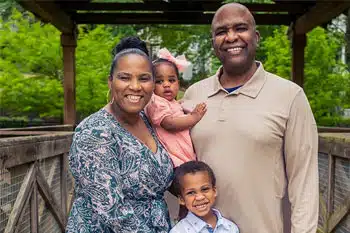
While it may not be intentional, people often say things that may be hurtful or use words in a way that can cause more harm than good.
Learning the right language around adoption is key. So we put together this list of some of the worst terms to use about adoption. We should all learn to use positive adoption language because words really do matter.
1. ‘Give up’ for adoption
When a mother chooses adoption, they are not “giving up” their baby. Instead, they are placing a child into a family that will love and care for them in an amazing way. In other words, they are making a loving choice that will allow their child the kind of life that they envision for them.
And when it comes to open adoption, it is not goodbye forever. The birth mother can stay connected with her child and their adoptive family. This plays a big part in this selfless choice.
2. ‘How much did the child cost?’
Adoptive parents didn’t buy their child. Adoption services cost money, not the babies. It is also rude to talk about the costs — even if you phrase it in the right way. If you are curious about the costs involved in adopting a child, you can do some research online to get a general idea of the costs involved in adoption.
3. ‘Visitations’
When you are referring to the child seeing their birth mother, they are not called “visitations.” This implies that there is a separation in place, and the child is being co-parented. Open adoption means seeing the child, getting to know them, and maintaining a connection with them as they get older. It is closer to an extended family relationship.
4. ‘Contract’ versus ‘agreement’
Open adoption is an agreement between the birth mother and adoptive parents. In most states, it is not a contract. Instead, families and birth mothers can create a post-adoption contact agreement that helps lay out the specific details about what type of contact the birth parents will have with the child going forward.
5. ‘Was the birth mother an addict?’
Not every birth mother chooses adoption because they are struggling with addiction. In fact, birth mothers come from all walks of life, with all different reasons why they are choosing adoption for their baby.
6. ‘Who are her real parents?’
It can be very hurtful to ask an adoptive mother about the child’s “real” parents. People typically are curious about the birth family, the biological parents, or the “natural” parents (on the original birth certificate) when they ask this question.
However, it’s very important to remember that the adoptive parents are the child’s parents. They are the ones there for the baby on nights that they are teething. They are there on the playground when the child falls and scrapes their knee. They are there to encourage them throughout the various highs and lows of life. They are as real as it gets.
7. ‘Does he know he’s adopted?’
It is not anyone else’s business except the adoptive family to discuss the matter of telling the child he was adopted. Modern adoptions allow children to learn their birth story from a young age, so they know where they came from and their history.
This personal process between adopted children and their adoptive parents allows young children to ask questions, build character, and learn more about the multitude of people that loved them enough to give them a stable, happy life.
8. ‘She’s so lucky!’
Calling a child “lucky” to get adopted implies that their birth mother’s situation may have been dangerous or harmful. This isn’t necessarily the case. Often, birth mothers who choose adoption simply understand that they will not be able to raise a child in the life or circumstances they wish their child to have.
In fact, most adoptive parents will tell you that they themselves are the ‘lucky ones’ to get the opportunity to be parents to the little one that was entrusted to their care.
9. Comparing adoption to pregnancy
Adoption is not always a stress-free, easy process — and neither is pregnancy. So when talking to an adoptive parent, comparing the two situations of adoption and pregnancy isn’t helpful. They are two completely different journeys.
10. Talking about looks
Be tactful when talking about an adopted child’s looks and how they compare to the adoptive family. Many adoptive families adopt babies from different racial backgrounds. And while they might not look like the family, it does not change how much they will love that child.
Over time, the child may come to look more like the adoptive parents, regardless of skin color. They may also pick up gestures or a certain lilt to their voice that is part of being raised in the adoptive family. These are environmental inputs that we all have, regardless of who we were raised by.
Whether you’re facing an unplanned pregnancy, or you are an adoptive family looking to adopt a child into your family, Lifetime Adoption can help. We are an experienced and compassionate adoption agency that provides services to birth parents and adoptive parents across the country.
We have been assisting families and expectant parents with their adoption plans and the adoption process since 1986. We look forward to helping answer your own questions. Contact us today!
Founder of Lifetime Adoption, adoptive mom, adoption expert, and Certified Open Adoption Practitioner (C.O.A.P).
Since 1986, adoption expert Mardie Caldwell has been dedicated to bringing couples and birth parents together in order to fulfill their dreams.
“Many years ago, I was also searching for a child to adopt. We didn’t know where or how to get started. Through research, determination, and a prayer, our dream of a family became reality. I started with a plan, a notebook, assistance from a caring adoption consultant and a lot of hard work; this was my family I was building. We had a few heartaches along the way, but the pain of not having children was worse!
Within weeks we had three different birth mothers choose us. We were overwhelmed and delighted. Many unsettling events would take place before our adoption would be finalized, many months later. Little did I know that God was training and aligning me for the adoption work I now do today. It is my goal to share with our families the methods and plans which succeed and do not succeed. I believe adoption should be affordable and can be a wonderful “pregnancy” for the adoptive couple.
I have also been on both sides of infertility with the loss of seven pregnancies and then conceiving by new technology, giving birth to a healthy daughter. I have experienced first-hand the emotional pain of infertility and believe my experience allows me to serve your needs better.
It is my hope that for you, the prospective parents, your desire for a child will be fulfilled soon.”





0 Comments